More Than A Survivor: Celebrating Queer Joy

At Sahiyo, we believe in creating a space where all voices are heard and celebrated. We acknowledge the unique experiences of Queer survivors within the FGC community and aim to provide support, inclusivity, and joy! In celebration of Pride Month, we asked members of our community what joy looks like to them: Umme Kulsoom Arif “My grandmother made a living making lace borders for dupattas and ridas when my father and his siblings were growing up, and now I make blankets for my family and friends. Though our relationship is not always an easy one, separated by generations and miles of ocean, I still have the ponchos, purses, and scarves she made me, her love and determination woven into every beautiful stitch. I may not have the patience she had to make intricate lace patterns, but I like to think I make up for it by crafting blankets large enough to wrap yourself in — my own way of showing the people I love how much they matter to me. The two blankets shown are ones I made for my parents — and one of them has over three miles of yarn in it!” Check out Sahiyo’s Instagram for more this Pride Month!
More Than A Survivor: Celebrating Queer Joy Campaign
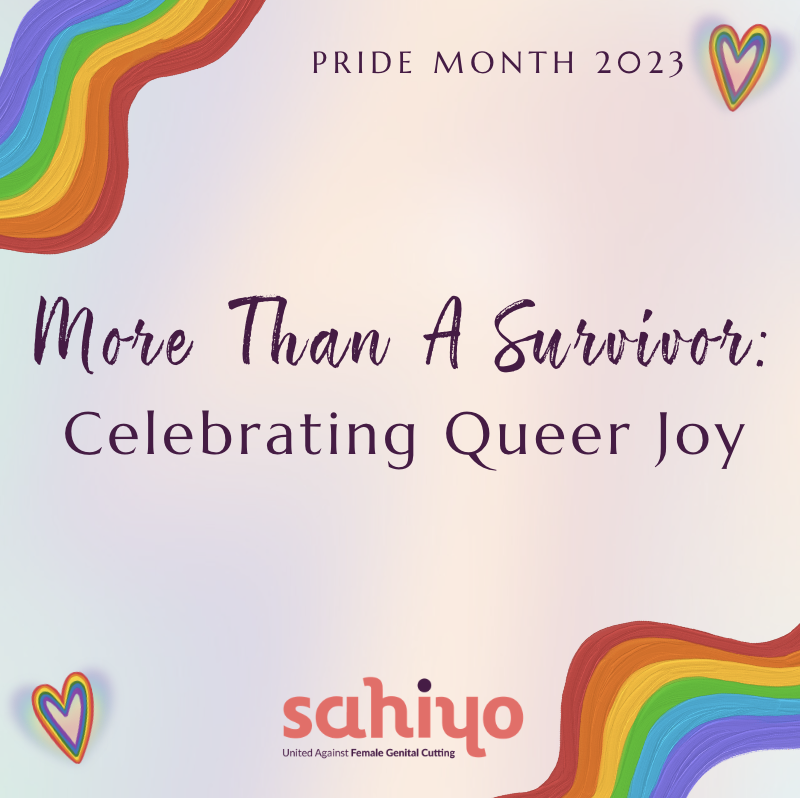
At Sahiyo, we recognize that our work to end female genital cutting (FGC) does not exist outside of Queer liberation, and members of the survivor community who are Queer have distinct experiences that deserve to be seen, heard, and made room for in the FGC sphere. Whether this means incorporating more gender-inclusive language, clarifying that outdated statistics only capture the experiences of women and girls, or providing a sense of community for Queer survivors, we are just getting started. Pride Month is a time for celebration, protest, and remembrance, of the challenges, and joys, surrounding Queerness and Queer liberation. Occurring every June in homage to the Stonewall Riots, Pride speaks to the enduring spirit of resistance against challenges that have historically affected, and continue to affect, the Queer community. To this end, Pride has a multifaceted purpose: it is as much advocating against the ongoing oppression of Queer folks and calling attention to human rights abuses occurring globally as it is dancing in the street and raucously cheering at a parade. To celebrate this Pride Month, we chose to uplift an angle of FGC survivorship and Queerness that honors and celebrates joy. Inspired by a conversation with Dena Igusti, a trans non-binary survivor of FGC, the significance of a “joy-centered campaign” became apparent: “I think it would be really great to see more campaigns where it’s seeing folks who are also Queer, who are also survivors, but also, overall, are also just doing well… Just hanging out, having fun, and also showing us outside of just trauma. I think it’s one of those things, a combination of wanting to know that exists and that I’m not alone… But also I think it is also nice to know other aspects of these survivors outside of what was done to them.” To Dena, seeing other survivors, or non-binary folks, outside of the context of their trauma gives them hope: “What was so important for me was… seeing them outside of [survivorship] and after that; looking back and being like, ‘Yeah, I went through that.’ It was a wild ride, but they get to have this joy and hope of saying everything in past tense. ‘This was horrible.’ ‘This was awful.’ ‘This was painful, but I’m here now.’” While we continue to push for inclusivity and intersectionality beyond the scope of this month, which includes discussing and working to address the unique challenges that affect Queer survivors, we hope to also uplift and celebrate our community members who are More Than A Survivor; they are here, Queer, and finding their joy.
Self-love to Sunera
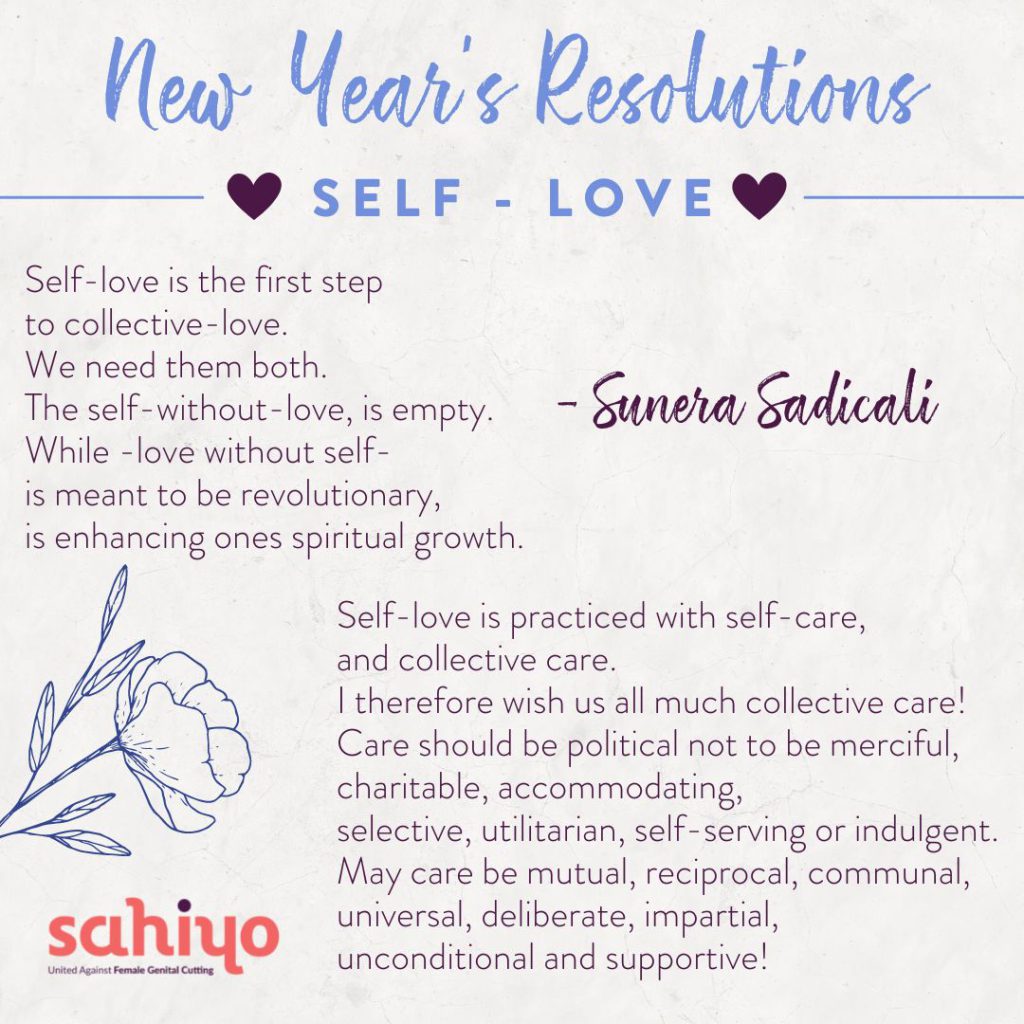
Portuguese/English Version O Amor-próprio évoltar à tua infância, e enfrentar os monstros na cara.É dizer em alto e bom som,já basta.É fazer das tuas entranhas,poesia deliberada.É permitir-te existir sem atalhos,nem rimas que outros compõem para ti. Self-love is the first stepto collective-love.We need them both.The self- without -love,is empty.While -love without self-is meant to be revolutionary,is enhancing one’s spiritual growth. O amor-próprio practica-se com autocuidado,e cuidados colectivos.Desejo pois muitos cuidados ao mundo!Que os cuidados sejam políticos para não serem misericordiosos, caritativos, acomodados,selectivos, utilitaristas, interesseiros ou indulgentes.Que os cuidados sejam mútuos, recíprocos, comunitários, universais, deliberados, imparciais,incondicionais e solidários! “Caring for myself is not self-indulgence, it is self-preservation, and that is an act of poltical warfare”. (Audre Lorde) English version Self-love isgoing back to your childhood,and facing the monsters in the face.It’s saying it loud and clear,enough.It is to make of your entrails,deliberate poetry.It’s allowing yourself to exist without shortcuts,nor rhymes that others compose for you. Self-love is the first stepto collective-love.We need them both.The self-without-love,is empty.While -love without self-is meant to be revolutionary,is enhancing ones spiritual growth. Self-love is practiced with self-care,and collective care.I therefore wish us all much collective care!Care should be political not to be merciful, charitable, accommodating,selective, utilitarian, self-serving or indulgent.May care be mutual, reciprocal, communal, universal, deliberate, impartial,unconditional and supportive!
Self-love to Olachi
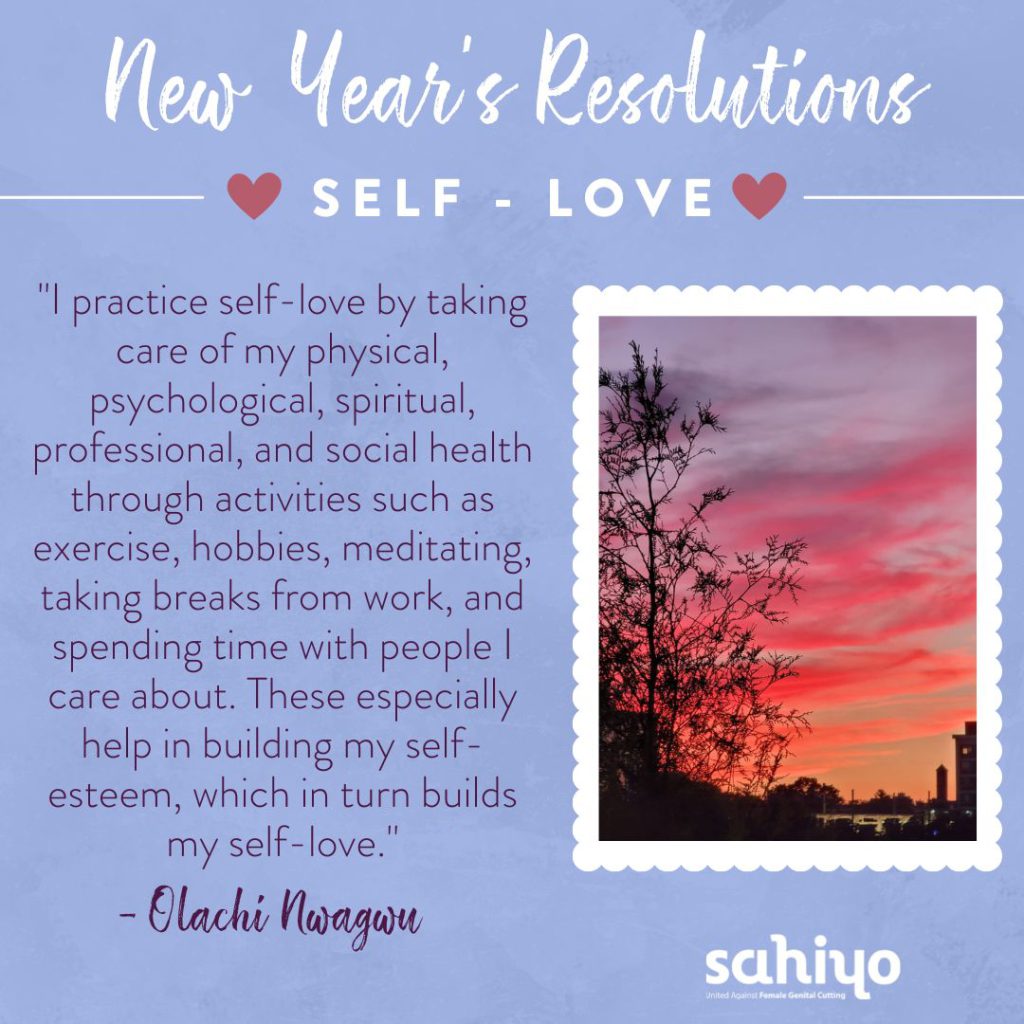
By Olachi Nwagwu What does self-love mean to you? In bell hooks’ book All About Love, she defines love as an action, not a feeling. She explores love as a combination of “trust, commitment, care, respect, knowledge, and responsibility.” So based on this, my definition of self-love would be that combination of trust, commitment, care, respect, knowledge and responsibility towards myself. How do you practice self-love? I practice self-love by taking care of my physical, psychological, spiritual, professional, and social health through activities such as exercise, hobbies, meditating, taking breaks from work, and spending time with people I care about. These especially help in building my self-esteem, which in turn builds my self-love. Why do you think self-care is important? I think self-care is important because it helps maintain our overall well-being. I consider my self-care in five categories: physical, psychological, spiritual, professional, and social. I find that a combination of any care under these five categories helps me build and maintain my self-love. Why do you think it is important to practice self-love? I believe it is important to practice self-love because it helps cultivate a healthy sense of self-worth, self-responsibility, and self-acceptance. How do you encourage yourself and your peers to practice self-care and self-love? I try to inspire myself and others to prioritize self-care and self-love by setting an example of self-care and self-love in my own actions, emphasizing the significance of looking after oneself, and sharing information and suggestions for self-care activities. From your perspective, what is the connection between body image and self-love? (how are they related?) I strongly believe there is a close relationship between self-love and body image, as the way an individual views their body can significantly affect their overall self-esteem. In the current society we live in, it is essential to cultivate a positive body image and to understand that self-worth is not solely determined by appearance. What is one thing you did for yourself today? One thing I did for myself today was go shopping with my roommate. This helped me relax and not feel overwhelmed or rushed by work or school. When do you think it is most important to practice self-love? It is most important to practice self-love when feeling overwhelmed or stressed, as it can help cope with difficult emotions and situations better. It can also help make better decisions in the moment when you’ve taken a step back and evaluated everything. Do you have any New Year’s resolutions on how to love yourself better this month and the rest of the year? I think this question can be answered with another quote from bell hooks’ book All About Love: “Self-acceptance is hard for many of us. There is a voice inside that is constantly judging, first ourselves and then others. That voice enjoys the indulgence of an endless negative critique. Because we have learned to believe negativity is more realistic, it appears more real than any positive voice. Once we begin to replace negative thinking with positive thinking, it becomes utterly clear that, far from being realistic, negative thinking is absolutely disenabling. When we are positive we not only accept and affirm ourselves, we are able to affirm and accept others.” Therefore, one of my New Year’s resolutions is to make an effort in prioritizing self-care and self-love daily, particularly through affirmations.
Self-love to Sushma
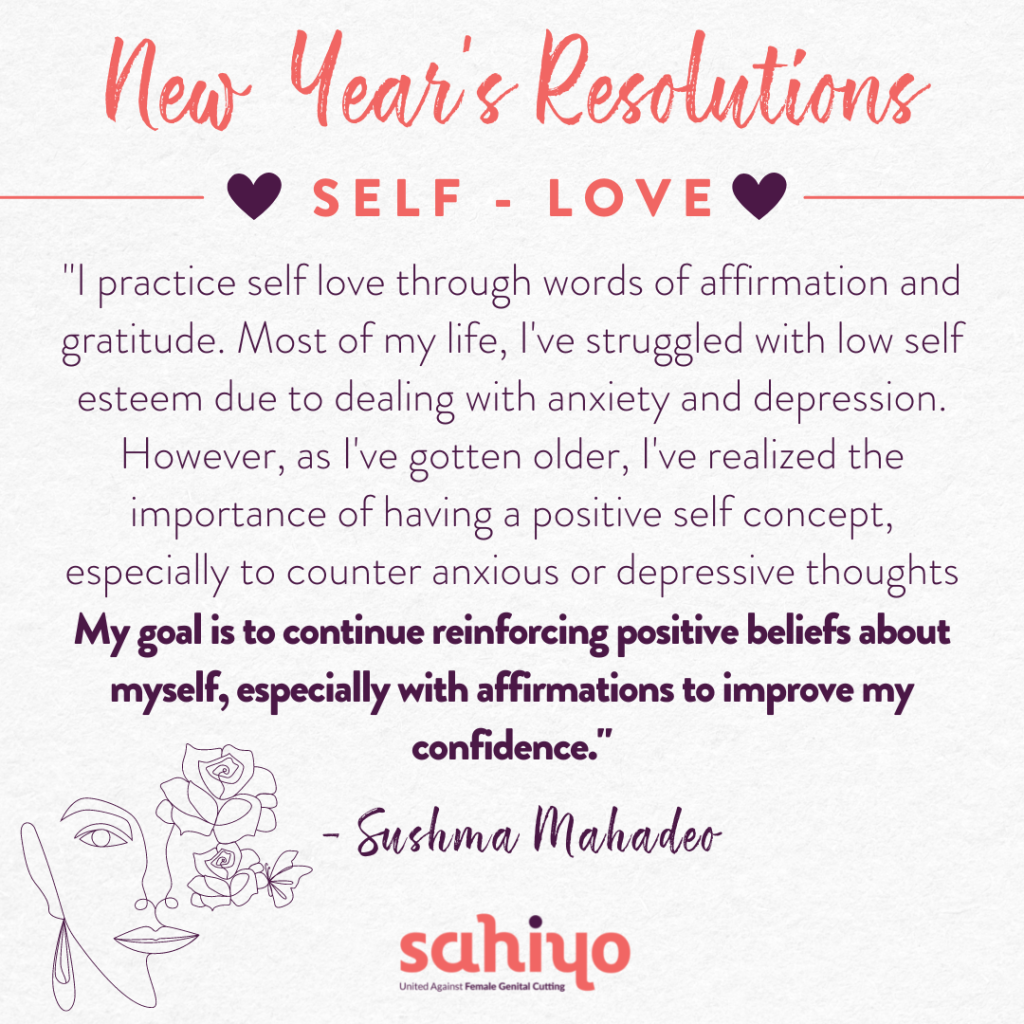
By Sushma Mahadeo What does self-love mean to you? To me, self-love is about loving yourself unconditionally. It means being proud of yourself on your good and bad days. It’s about being able to look in the mirror and fully accept and like who you are, even if you have insecurities. It’s knowing that you are important just by being on this earth, and worthy of respect. If you love yourself, you don’t tolerate disrespect from others. How do you practice self-love? I practice self love through words of affirmation and gratitude. Most of my life, I’ve struggled with low self esteem due to anxiety and depression. However, as I’ve gotten older, I’ve realized the importance of having a positive self concept, especially to counter anxious or depressive thoughts. I used to think people were lying if they complimented me, especially if they called me beautiful, because I didn’t see it in myself. However, I’ve realized I can retrain my brain to see myself in a better light by making a habit of reinforcing positive beliefs through words of affirmations. I also practice gratitude, and it helps remind me of how abundant my life already is. Gratitude helps put things into perspective sometimes when I’m feeling down about myself. Additionally, I do simple acts of self-care, such as taking time to exfoliate or use a new face mask. Little acts of self-care help me feel more special about myself. How do you encourage yourself and your peers to practice self-care and self-love? I constantly send my friends positive text messages with words of affirmation or reminders of how amazing they are and how much I appreciate and love them. I always tell my friends to be kind to themselves and take care of themselves because they matter, more than whatever is stressing them out. I follow my own advice as well, and reinforce the same affirmations to myself. From your perspective, what is the connection between body image and self-love? (how are they related?) From my experience, I’ve disliked myself more when I had a terrible body image; I didn’t feel confident, or worthy of happiness. I think society keeps trying to impose certain beauty standards and the idea that once we look a certain way, then we can be happy, and only then are we worthy of love and good things. However, those ideas and standards are so harmful, and make so many individuals unhappy. Self-love is about realizing that beauty is unique and that we can appreciate how other people look while also appreciating what we see in the mirror. It’s also about realizing that we are deserving of the best things in life regardless of how we look. What is one thing you did for yourself today? I stretched and exercised my body. Not only did the exercise help me feel good, but I gained a better appreciation for my body. When do you think it is most important to practice self-love? I think it’s most important to practice self-love when you’re not feeling great about yourself. But it’s also important to practice it when you have good days because you deserve to enjoy yourself everyday. Do you have any New Year’s resolutions on how to love yourself better this month and the rest of the year? My goal is to continue reinforcing positive beliefs about myself, especially with affirmations to improve my confidence. Below is a picture of a gratitude journal because I am trying to use one to improve my self-love.
Self-Love & Body Image
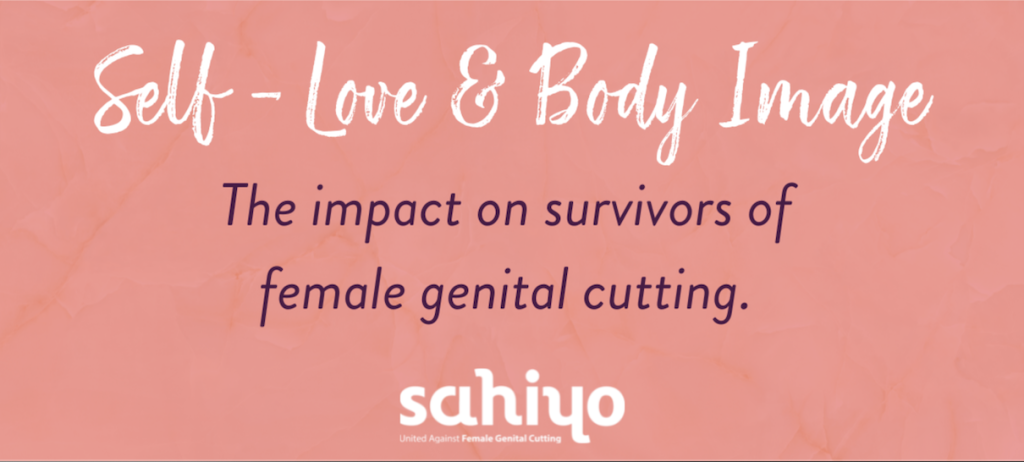
By Trisha Kini Body image, which is closely tied to mental health and general wellbeing, refers to the way one perceives their body and the positive, negative, and/or neutral feelings that arise from that perception. Whether it is in relation to skin, hair, or the shape/size of a body part, body image influences people in different ways. Oftentimes, body image has an impact on self-acceptance, self-love, and self-esteem (Canadian Mental Health Association, BC Division, 2015). Beauty standards, which can be shaped by society, our peers, friends, and family, are some of the largest driving factors for the expectations we see for body image today. The beauty standards we observe in films and media that are closely tied with ethnicity, race, body shape, and other features influence viewers to believe that those are the features a human should possess to be attractive and desirable. These expectations have changed over time with ever evolving movies, television shows, magazines, and social media. Today, these standards are often unrealistic, and cause many people to struggle with body image. Although struggling with one’s perception of their body may not be uncommon, it can be detrimental to one’s identity, growth, and mental health. In this blog post, we will explore how body image can impact survivors of female genital cutting (FGC), and provide resources on how to navigate conversations related to body image, self-love, and FGC. [youtube url=”https://www.youtube.com/watch?v=tEpJ20ArbTA&t=1s”] Lena describes her experience with FGM/C and the shame she felt FGC survivors can be impacted by body image It is imperative to acknowledge that survivors of FGC are impacted by body image in ways that non-survivors may not be able to relate to. Body image, and the negative feelings that arise, can also prevent survivors of FGC from seeking medical care due to stigmatization associated with female genitalia, as well as women’s and gender non-conforming, non-binary individuals’ bodies. This impact can deter survivors from enthusiastically seeking healthcare or trusting their health provider. Additionally, survivors of FGC may struggle with body image in a way that also impacts sexual activity. Centering survivors in conversations related to body image When talking with survivors about body image, it is important to center survivors in the conversation. Listening, and reflecting on their feelings with regard to their experiences with body image can allow more space for survivors to feel heard and validated. Keeping in mind that everyone’s relationship with their bodies differs based on their life experiences can be helpful when navigating conversations surrounding body image, self-love, and acceptance. Expressing your appreciation for their trust in sharing, and encouraging their growth and journey in understanding their relationship with themselves can also be validating and allow the person sharing to feel more comfortable with expressing their feelings. Learn more To learn more about seeking support and supporting survivors of FGC, we have included several resources below. We hope to elevate more conversations about self-love, and encourage our community to share these resources and talk more about the measures and steps you take to practice self-love, self-care, and body positivity. Resources on how to Support FGC Survivors: United Against Female Genital Cutting – Sahiyo Resources Sahiyo – United Against Female Genital Cutting – Survivor Support Resources Sahiyo – United Against Female Genital Cutting – FGC Survivor Support Line Voices to End FGM/C Website Non-Sahiyo Resources: Survivor Mental Health Support Group About FGC and Mental Health U.S. Network to End FGM/C Resources
Each One, Reach Bhaiyo
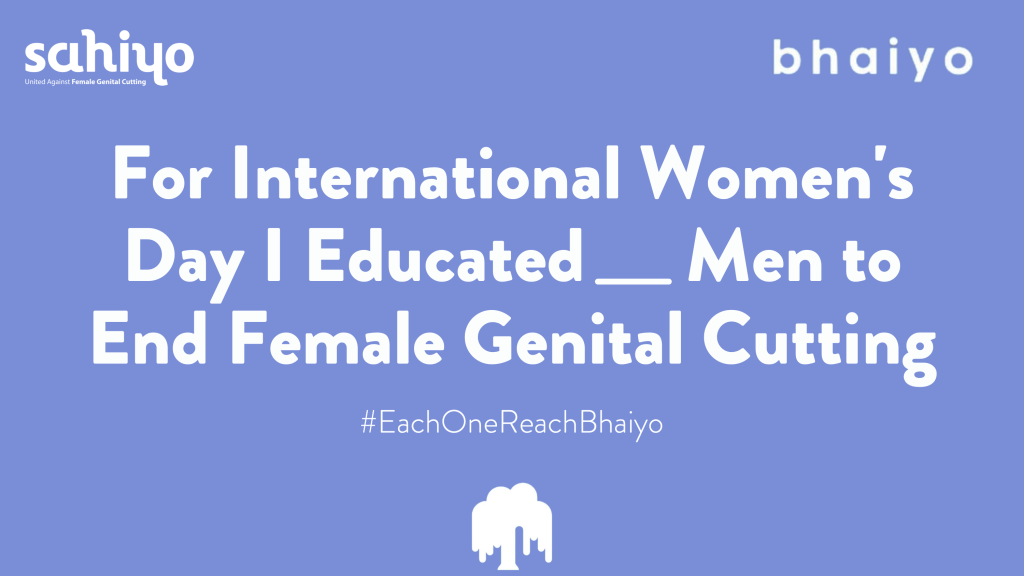
In honor of International Women’s Day on March 8th, Sahiyo will officially launch our new campaign “Each One, Reach Bhaiyo”. During this campaign, Sahiyo will encourage staff, volunteers, and community members to reach out to and educate at least one male-identifying person in their life about female genital cutting (FGC) and encourage them to join the Bhaiyo program. Through this campaign we hope to involve men in the important work of protecting women and girls. We know that just one conversation can spark a global change towards preventing the human rights violation that is FGC amongst future generations. This International Women’s Day, and throughout women’s history month, let’s stand up for women and girls. Leading up to the campaign, we will be sharing materials to educate and guide people on having effective conversations with men about FGC. If you are struggling to start a conversation with the men in your life about this topic, be on the lookout for our materials in the coming weeks. How to Participate: To participate in our campaign, share or post a picture of yourself with a placard saying that you have reached out to someone with the hashtag #EachOneReachBhaiyo. Our Programs Coordinator, Catherine, has done an example below: You can download the template here. We have also drafted a list of questions if people wish to respond to them in blogs or in their submissions! Why did you want to reach out to another man in your life to discuss FGM/C? What was his reaction? Was he aware of FGM/C? What advice would you give to others trying to reach out to the men in their lives? We will begin posting these submissions in March to help raise awareness about the need for crucial conversations with men about this issue. Each one, Reach Bhaiyo! Please send your submissions to programscoordinator@sahiyo.com or text them on Whatsapp to +1 202 754 2563
Amnesty India features Sahiyo and WeSpeakOut in its ‘Brave’ campaign
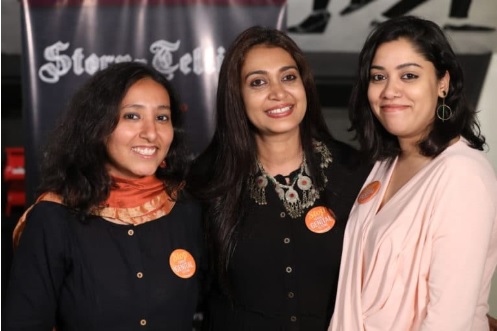
Leading human rights organisation Amnesty India has featured Sahiyo and WeSpeakOut — the two collectives working to end Female Genital Cutting in India — in its new campaign titled “Brave”. The campaign aims to highlight the work of individuals and groups working to defend human rights, truth, and justice in India, despite facing threats, attacks and other kinds of backlash. Other brave individuals featured in the campaign are: Chandrashekhar Azad, who founded the Bhim Army to fight for Dalit rights in Uttar Pradesh; Sagolsem Menor Singh, who campaigns for justice for the families of those killed in fake encounters in Manipur; and Gauri Lankesh, the journalist and human rights activist who was shot dead for her views last year. Sahiyo and WeSpeakOut have been recognised for raising their voices against a taboo topic: the ritual of cutting young girls’ genitals in the name of culture and religion. During the course of the year, the Amnesty campaign will help support and amplify Sahiyo’s work.
Each One Reach One 2: Read this conversation guide to get started
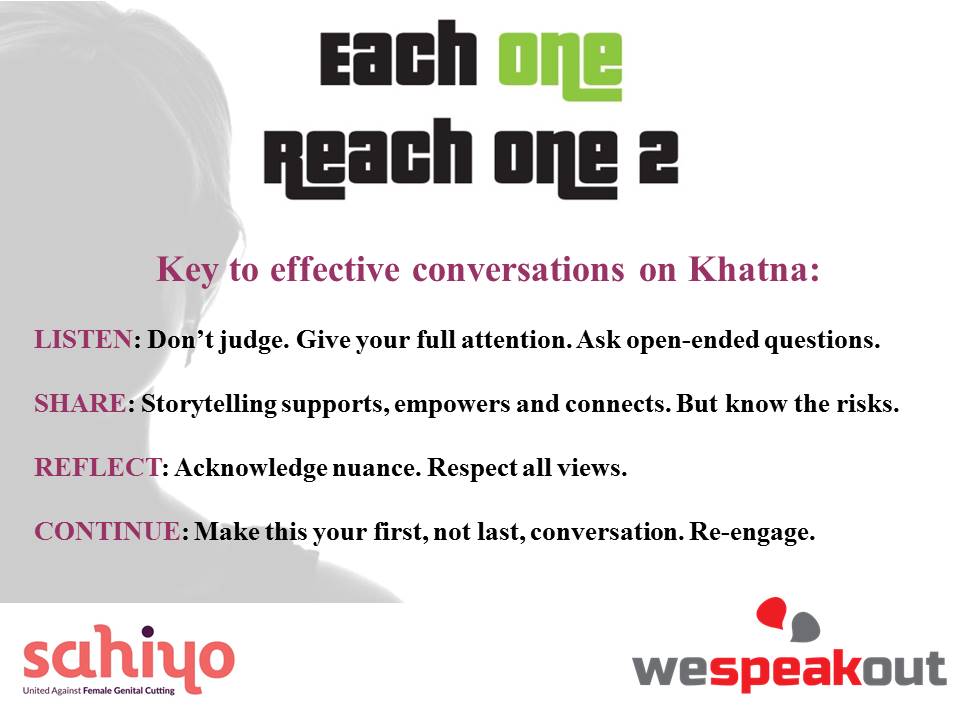
by Sahiyo and WeSpeakOut Each One Reach One 2, our month-long outreach campaign that coincides with Ramzan, calls upon everyone, especially Bohra women and men, to reach out to at least one other Bohra to engage in a meaningful discussion around Khatna. Our focus this year is to move the conversation forward, by exploring ways to respectfully and sensitively engage in discussions with our family, friends and the wider community. Since the arrests in Detroit, many of you have reached out to us asking for advice on how to broach the topic of Khatna with your close friends and family, and how to have sustained conversations with them. To help you with this, we have prepared a guide on effective communication in the context of Khatna. We would like you to reflect on this guide as you begin and continue your conversations. In the sections below, we explore various facets of conversation: from the power of listening and the method of storytelling, to the challenges of acknowledging nuance and understanding the importance of continued dialogue. Finally, in keeping with the spirit of this sacred month, we encourage you to listen with love, speak with kindness, think without anger, and love without judgment. Effective Conversation Guide 1) Listening: The simple act of genuinely listening to another person is powerful. Listen with your full attention, without judgment or assumptions. Simply listen. Instead of giving advice or telling a person what to feel or do, be a sounding board and brainstorm options. However, setting appropriate limits is important for effective communication. If someone is being hateful towards you, it is okay to not continue the conversation. a) Use open-ended questions: Unlike leading questions or close-ended questions that can be answered only by yes or no, open-ended questions help people explore their own truths and connect with their own inner strength. Ask “What are you feeling?” instead of “Do you feel all right?” b) Use reflective language: Use phrases such as “I hear you’re feeling…” or “It sounds to me like…” coupled with more tentative statements like “I wonder if you’re feeling…?” or “Did I get that right?” This helps people to name what they are experiencing, invites them to correct your understanding, and conveys your sincere interest in what they have to say. When you reflect back the language that people use to describe their own experience, you meet them on their own ground. Some FGM/C-related words to keep in mind as you listen to someone’s specific language include how they refer to FGM/C – “khatna,” “FGM”, “FGC”, “female circumcision”, “procedure”. Using the same words as the speaker lets her know that you respect her point of view, even if it’s not your own. c) Validate personal experiences: Stigma and trauma can often make people feel like they are alone, or that they are the only ones feeling that way. When you initially listen to their stories, it is not the time to engage in a political fight or an academic argument. Whether it is a woman sharing her experience of khatna or someone who states that khatna must be done for religious reasons, help the person feel heard, without judgement. You can share your views at a later stage. 2) Sharing stories during conversations: There is an art and a craft to storytelling that can be intimidating for people who find it hard to believe they have any story worth sharing, especially if it’s about something personal, taboo, or hidden. Storytelling practices support an individual’s ability to think through what it is she wants to say, whom she wants to say it to, and what she hopes will happen as a result, while retaining significant control over the use and distribution of her narrative. a) Know the risks: Sharing personal stories could help a person feel more empowered and connected to other friends or family members who have undergone FGC. But it can also come with personal risks: a person may feel more vulnerable and alone after sharing her story, or might be shamed by others. Don’t pressure, coerce or shame others into telling their story, even if it is to promote a cause they believe in. Work to create the conditions necessary for someone to feel encouraged and supported to share their story with you. b) Use whole stories, not talking points: Stories have the ability to persuade, influence, inspire, and galvanize people to action. Human, vulnerable, authentic personal stories don’t fit easily into talking points, but they have incredible power to connect with others across differences. Work to create the conditions necessary for a someone to feel encouraged and supported to share their story with you. 3) Embrace Grey Areas: A person who has undergone khatna may have experienced pain and sadness and/or nothing at all. She may want to keep it private and need emotional connections with others. She may think FGC is wrong and still believe it is a religious right. She may feel many other combinations of emotions that could seem inconsistent at the outset. It is important to recognise that multiple truths can live together simultaneously. Issues around how khatna has happened and her feelings around it are not always black and white, and to open the door to change and new insights, we need to acknowledge and explore the grey areas. It is helpful to use a ‘both/and’ approach instead of an ‘either/or’ approach. Change your perspective: Sure, it may be easier if the whole world saw the issue in the same way you do, but that’s not realistic. Conflict exists because we are human, and because our different background, values, and beliefs mean that we perceive the world and its issues in unique, diverse ways. Hold space for universal human truths–such as our shared ability to be compassionate and loving–and recognize some experiences as specific and particular, such as the experience
Announcing Each One Reach One 2: Let’s discuss Khatna this Ramzan
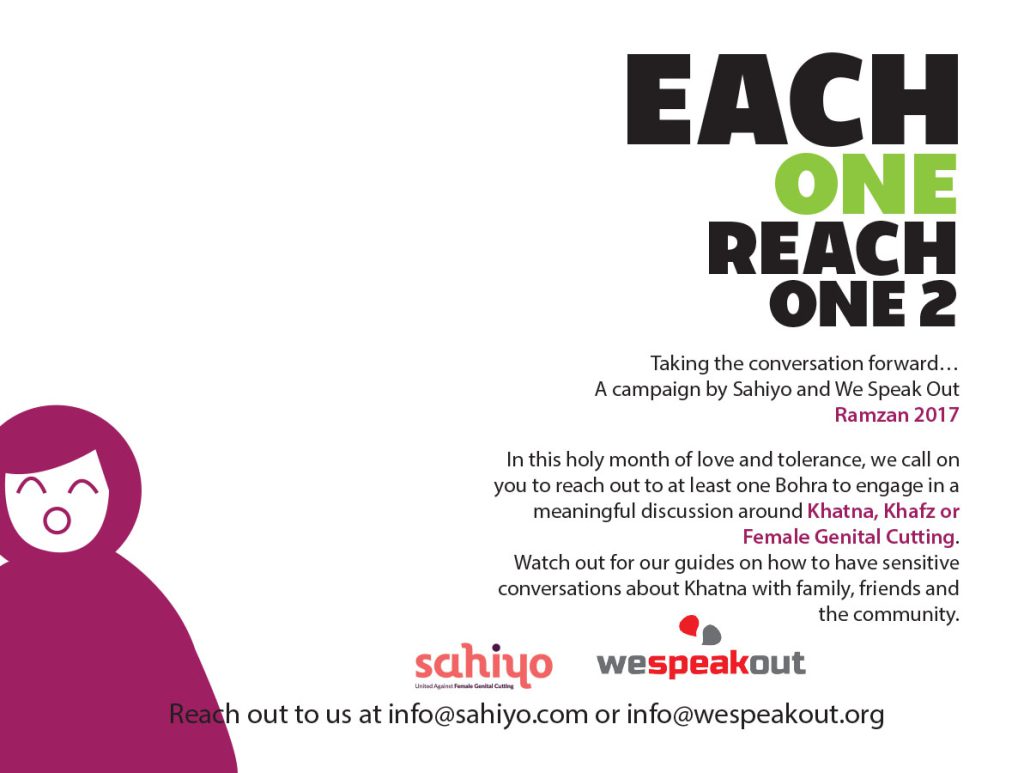
EACH ONE REACH ONE 2:Taking the conversation forward….Ramzan 2017A campaign by Sahiyo and We Speak Out In this holy month of Ramzan, we invite you to participate in Each One Reach One 2, the second edition of a global campaign to promote conversations around Khatna among Bohras. Last year, in February 2016, Sahiyo and Speak Out on FGM (now We Speak Out) launched the first edition of Each One Reach One, a campaign to help break the silence around the practice of Khatna, Khafz or Female Genital Cutting (FGC) in the Bohra community. For one month, we encouraged each one of you to have a conversation about Khatna with at least one other Bohra — a friendly, respectful, non-judgmental conversation that would help us all understand one another. A year down the line, we can say with confidence that the silence around Khatna has definitely been broken. The recent arrests of Bohra doctors in the United States have encouraged debate and introspection, both within and beyond the community. There is greater visibility in the media regarding FGC among Bohras. Legal efforts at ending this practice have led to a call for consultations from the Women and Child Development Ministry in India. Although we have achieved last year’s objective of starting a conversation around Khatna, there is a lot more work to be done. Today is the first day of Each One Reach One 2, our month-long outreach campaign that coincides with Ramzan. This campaign calls upon everyone, especially Bohra women and men, to reach out to at least one other Bohra to engage in a meaningful discussion around Khatna. Our focus this year is to move the conversation forward, by exploring ways to respectfully and sensitively engage in discussions with our family, friends and the wider community. As you have seen through reactions to our work on social media, we are still received by many within our community with hostility and contempt. It is important for us to continue to respond to criticism with love and tolerance. Sahiyo and We Speak Out have been accused of shouting over Bohra women’s voices. We want to remind our community that we provide a platform to those who have been silenced, so that everyone who wants to speak has an opportunity to share their story. We hope to connect, not divide; to engage, not shut out; to listen, not mute; to reach out, not polarise; and to love, not hate. Our campaign for EORO 2 focuses on guiding you to have meaningful conversations in various scenarios within and outside your families. Through our communication guides, we will suggest open-ended questions that you may ask your loved ones in order to engage in a sensitive discussion. As usual, we will also complement these guides with the relevant facts around Khatna. We encourage Bohras within India and abroad to participate in our campaign. Do continue to watch this space over the next month as we publish our guides. To begin with, you can read our basic guide to effective conversations by clicking here. Our conversation guide is informed by the concept of “Pro-Voice”, a word coined by the founders of abortion-rights group Exhale. Being Pro-Voice is about listening to one another’s stories with empathy, without an agenda or judgement. Learn more about Pro-Voice through this TED talk. We would like to wish each one of you a blessed Ramzan full of fasting, prayer, forgiveness and charity. In keeping with the spirit of this sacred month, we encourage you to listen with love, speak with kindness, think without anger, and love without judgment. As you participate in Each One Reach One 2, feel free to reach out to us at info@sahiyo.com or info@wespeakout.org to share your experiences, questions, perspectives and feedback.
